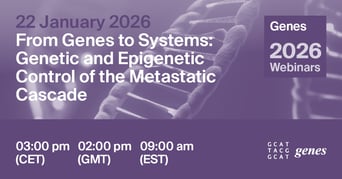- 2.8Impact Factor
- 5.5CiteScore
- 15 daysTime to First Decision
News & Conferences
Latest News & Announcements
Latest Conferences
Propose a Conference Collaboration
Promote and publicise your upcoming conference with MDPI.
All News & Conferences
News & Announcements
MDPI Virtual Academic Publishing Workshop (New Harvest), 25 February 2026
20 February 2026
News & Announcements
MDPI’s Open Access Program Reaches 1,000 Institutions Worldwide
18 February 2026
News & Announcements
World Pulses Day—“Pulses of the World: From Modesty to Excellence”, 10 February 2026
11 February 2026
News & Announcements
Acknowledgment to the Reviewers of Genes in 2025
6 February 2026
News & Announcements
MDPI INSIGHTS: The CEO's Letter #31 - MDPI 30 Years, 500 Journals, UK Summit, Z-Forum Conference, APE
2 February 2026
News & Announcements
Genes | Invitation to Read the Editor’s Choice Articles in Q2 of 2025
27 January 2026
MDPI Conference
Genes Webinar | From Genes to Systems: Genetic and Epigenetic Control of the Metastatic Cascade, 22 January 2026
22 - 22 January 2026
News & Announcements
Genes Webinar | From Genes to Systems: Genetic and Epigenetic Control of the Metastatic Cascade, 22 January 2026
20 January 2026
News & Announcements
MDPI’s Newly Launched Journals in December 2025
9 January 2026
News & Announcements
International Day of Epidemic Preparedness, 27 December 2025
25 December 2025
News & Announcements
Meet Us at the Plant & Animal Genome Conference 33 (PAG 33), 9–14 January 2026, San Diego, CA, USA
17 December 2025
of 27










